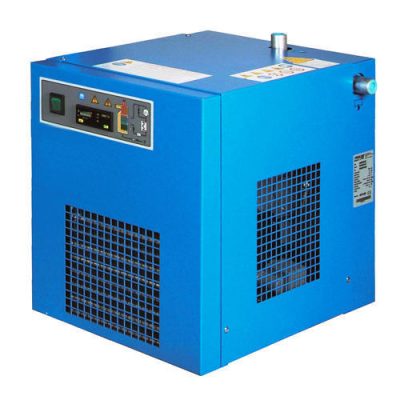
Compressed air contains naturally-occurring moisture that can have a negative impact on applications that need moisture-free air. Air dryers in GA are a popular solution for removing moisture content. And one of the most common options is the refrigerated air dryer because can reach an acceptable dewpoint in general industrial plant air applications.
Refrigerated air dryers in GA operate with a principle that is comparable to domestic refrigerators or residential air conditioning systems. The compressed air is chilled in an air-to-refrigerant heat exchanger to about 35°F. This is the temperature where the moisture reduces and is drained off.
An air-to-air heat exchanger is used to precool the incoming air, and reheat the outgoing air as it exits the dryer. The compressed air that leaves the dryer typically has a pressure dewpoint of 35 to 50°F.
In a non-cycling refrigerated dryer, the refrigerant continuously circulates through the system. Because both the movement of compressed air and ambient temperatures vary, a hot gas bypass valve is often used to control the temperature of the refrigerant and prevent freezing operating conditions within the system.
In many designs, the refrigerant vaporizes within the air-to-refrigerant heat exchanger. It is then condensed after being compressed by an air- or water-to- refrigerant heat exchanger. This design delivers rapid response to changes in operating loads.
The majority of compressed air systems don’t function under static flow and temperature conditions. In order to match dryer energy consumption to air demand, a variable speed refrigeration system can be used to regulate the refrigerant compressor during diminished loads and lower temperature conditions.
This provides significant savings in operating costs compared to non-cycling dryers.Advantages of refrigerated air dryers include:
Low initial capital cost;
Relatively low operating cost;
Low maintenance costs.
Gardner Denver air treatment components are designed to work effortlessly with their rotary and reciprocating compressors. Compressed air has long been described as the fourth utility after electricity, natural gas and water. It is often the perfect energy source for many industrial, commercial and instrument applications.
When compressing air, moisture naturally forms. Eliminating this moisture with a refrigerated compressed air dryer or desiccant compressed air dryer is fundamental to avoid costly equipment failure, product contamination and distribution system breakdown.
Gardner Denver offers a variety of air dryers that can work alone or in combination with an air filter to meet your dewpoint requirements to:
Keep lubricants from being washed away from downstream components,
thereby extending product life;
Reduce product contamination in applications such as mixing, conveying,
cooling and product blow down;
Reduce compressed air system corrosion which would increase pressure
drop and operational costs.
Wondering if refrigerated air dryers in GA are right for your application? You don’t have to wonder - call our office today and speak with one of our experts. And don’t forget that we also offer engineering services, repairs and parts sales.



Notifications